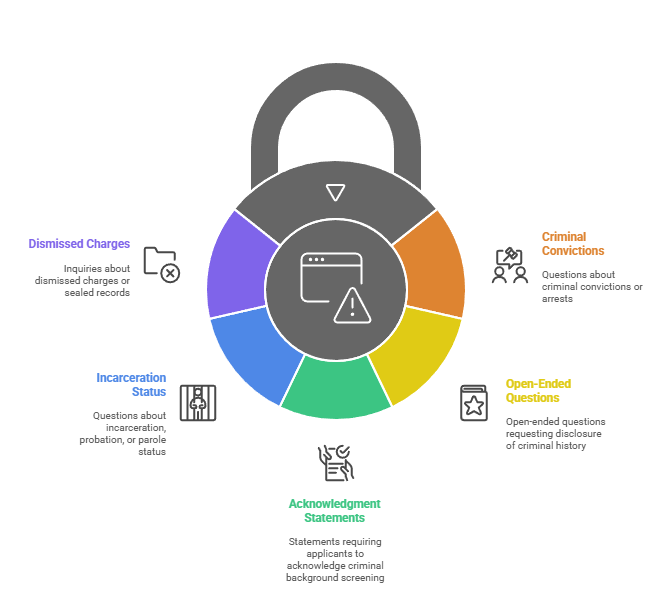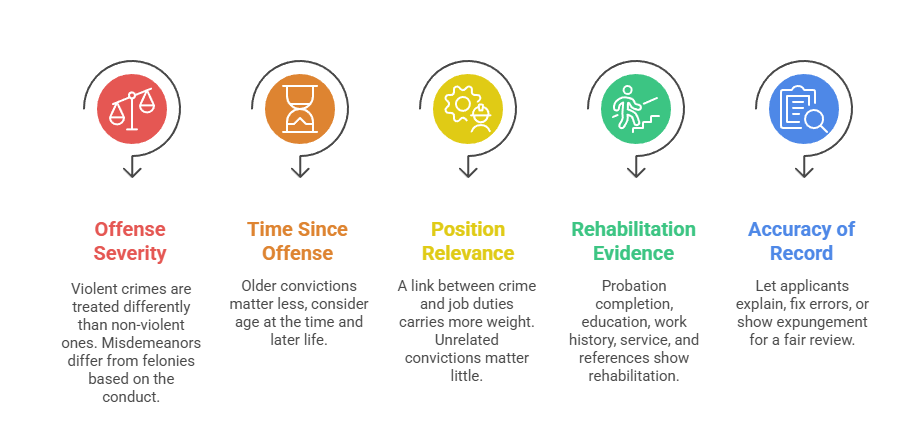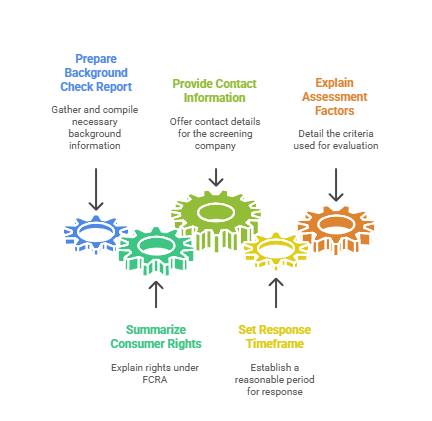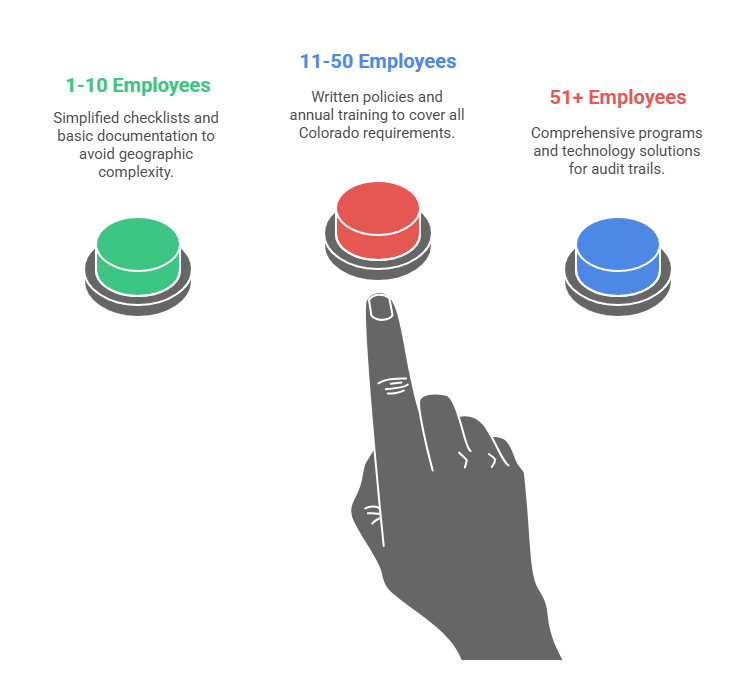Colorado employers face one of the nation's most complex background check compliance landscapes. They must navigate state-level "ban the box" restrictions, municipal ordinances in cities like Denver and Boulder, federal FCRA requirements, and unique cannabis industry considerations that don't exist in most states. This comprehensive guide provides practical, actionable compliance strategies for hiring managers, HR professionals, and business owners operating in Colorado's diverse economy. It covers everything from tech startups to hospitality businesses, ensuring legal adherence while maintaining efficient hiring processes.
Key Takeaways
- Colorado's state-level ban the box law prohibits employers from inquiring about criminal history on initial job applications, with timing requirements that differ significantly from federal FCRA guidelines.
- Denver and Boulder enforce additional municipal background check ordinances that layer onto state requirements, creating geographic compliance complexity for multi-location Colorado employers.
- Employers must provide applicants with specific notices and obtain written consent before conducting background checks, following both Colorado and federal FCRA standards.
- The state requires a mandatory waiting period after conditional job offers before taking adverse action based on criminal records, with individualized assessment obligations.
- Cannabis-related convictions receive special protections under Colorado law, prohibiting employment discrimination for lawful marijuana use in most positions.
- Background check costs and processing times vary significantly by county, ranging from $6.85 to $39.50 for CBI checks and 3-15 business days for completion.
- Colorado employers in safety-sensitive industries face different compliance standards, with specific exemptions for positions involving vulnerable populations or federal requirements.
- Failure to comply with Colorado background check laws can result in penalties up to $5,000 per violation, plus potential civil litigation and reputational damage.
- Remote work companies headquartered outside Colorado must still comply with state laws when hiring Colorado residents, regardless of company location.
Understanding Colorado's Background Check Legal Framework
Colorado has established a comprehensive regulatory environment governing employment background checks. The framework combines state statutes, municipal ordinances, and federal requirements. This legal structure addresses three primary areas: anti-discrimination protections for applicants with criminal histories, procedural requirements for conducting background checks, and special considerations for cannabis-related records. Employers operating in Colorado must navigate this multi-layered system while maintaining efficient hiring processes.
The Colorado Revised Statutes §8-2-108 forms the foundation of the state's ban the box law. It took effect in September 2019. This legislation fundamentally changed when and how employers can inquire about criminal backgrounds during the hiring process. Additionally, the Colorado Anti-Discrimination Act (CADA) provides protections against discriminatory practices. Meanwhile, the federal Fair Credit Reporting Act establishes baseline consumer protection standards that apply nationwide.
State vs. Municipal Jurisdiction
Colorado's approach creates compliance complexity because state law sets minimum standards while municipalities can implement more restrictive requirements. Denver's Fair Chance Employment Ordinance and Boulder's ban the box provisions go beyond state requirements in several key areas. Employers with locations in multiple Colorado jurisdictions must implement policies that satisfy the most stringent applicable standard. This ensures consistent compliance across operations.
| Jurisdiction | Application Inquiry Ban | Timing Requirements | Additional Provisions |
| Colorado State | Yes, on initial application | After interview or conditional offer | Individualized assessment required |
| Denver | Yes, expanded scope | After conditional offer only | Delay notification requirements |
| Boulder | Yes, on application | After conditional offer | Additional adverse action notice |
These geographic variations mean that a compliant background check process in Colorado Springs may violate Denver's ordinance. HR professionals must maintain location-specific procedures or adopt the most protective standard company-wide.
Federal FCRA Overlay
The Fair Credit Reporting Act establishes procedural requirements that apply regardless of state or local laws. Colorado employers must comply with FCRA's disclosure and authorization requirements. They must provide pre-adverse action notices and use consumer reporting agencies that maintain reasonable procedures for accuracy. The intersection of FCRA with Colorado-specific requirements creates a comprehensive compliance obligation that exceeds either framework individually.
FCRA requires employers to obtain written authorization before procuring background reports. It mandates standalone disclosure documents. The law also requires following specific adverse action procedures that include providing copies of reports and FTC summary of rights. Colorado's additional requirements layer onto this federal foundation rather than replacing it.
Industry-Specific Exemptions and Requirements
Certain Colorado industries face modified background check standards due to safety considerations or federal mandates. Healthcare facilities, childcare providers, financial services companies, and cannabis businesses operate under specialized frameworks. These exemptions don't eliminate compliance obligations but rather modify timing requirements or expand permissible inquiry scope.
Safety-sensitive positions involving vulnerable populationsâchildren, elderly individuals, or people with disabilitiesâallow earlier criminal history inquiries in many cases. However, employers must document legitimate business necessity. They must apply exemptions narrowly to avoid discrimination claims.
Colorado Ban the Box Law: Practical Application
Colorado's ban the box statute fundamentally restructures the hiring timeline. It prohibits criminal history inquiries during initial application stages. The law applies to all employers with at least one employee in Colorado. This affects businesses of every size from solo operations to large corporations. Understanding the specific timing requirements and procedural obligations determines whether your hiring process achieves compliance or creates legal liability.
The statute prohibits including questions about criminal convictions, arrests, or criminal history on job applications. Employers cannot require applicants to disclose this information until after an initial interview has occurred. Alternatively, they can wait until after making a conditional employment offer. This timing flexibility allows companies to choose the approach that best fits their hiring workflow while maintaining legal compliance.
The definition of "initial application" includes any document, form, or online submission used to screen candidates for employment consideration. This encompasses paper applications, online portals, applicant tracking systems, and even informal submission processes. Employers must review all candidate-facing materials to ensure compliance. This includes third-party recruiting platforms and staffing agency processes.
Prohibited application elements include:

- Checkboxes asking about criminal convictions or arrests
- Open-ended questions requesting disclosure of criminal history
- Statements requiring applicants to acknowledge criminal background screening
- Questions about incarceration, probation, or parole status
- Inquiries about dismissed charges or sealed records
The prohibition's scope extends beyond direct questions. It includes any language that might discourage applicants with criminal histories from applying. Warning statements about background checks or emphasizing "clean record" preferences can create compliance concerns even without explicit questions.
Timing Requirements for Criminal History Inquiries
Colorado law provides two compliant pathways for when employers may inquire about criminal backgrounds. They can do so after conducting an initial interview or after extending a conditional employment offer. Most employers choose the conditional offer pathway because it provides greater certainty. It also reduces time investment in candidates who may not advance. However, high-volume hiring operations sometimes prefer the post-interview option to streamline final stages.
The "initial interview" standard doesn't require in-person meetings. Phone screens, video interviews, and structured interview processes all qualify. Once any substantive interview occurs, employers may inquire about criminal history for that specific applicant. However, the conditional offer approach creates cleaner audit trails. It reduces potential discrimination claims by ensuring all candidates reach the same stage before background screening occurs.
Conditional Offer Best Practices
Extending a conditional employment offer triggers the ability to conduct comprehensive background checks while protecting employers through contingency language. The offer should clearly state that employment is contingent upon satisfactory completion of background screening. It should specify what "satisfactory" means for your organization. Written conditional offers create documentation proving compliance with timing requirements while establishing clear expectations.
Essential conditional offer components:
- Position details: Include specific title, compensation, start date, and location to demonstrate legitimate offer status.
- Contingency language: Clearly state that employment is conditional upon background check results, drug screening if applicable, and verification of credentials.
- Scope disclosure: Inform candidates what the background check will includeâcriminal records, employment history, education verification, credit reports if applicable.
Conditional offers should use clear, unambiguous language. A reasonable person should understand it as an employment offer rather than continued consideration. Vague language like "moving forward in the process" doesn't establish the conditional offer threshold for compliance purposes.
Colorado Criminal History Employment Screening Requirements

Once the timing requirements are satisfied, Colorado employers must follow specific procedural standards when conducting criminal background checks. These requirements protect applicant rights while allowing employers to make informed hiring decisions based on legitimate business needs. The process involves disclosure obligations, authorization requirements, individualized assessments, and specific adverse action procedures. These exceed basic FCRA compliance.
Colorado law requires employers to evaluate criminal history through an individualized assessment rather than blanket exclusion policies. This means automatic disqualification based on conviction categoriesâsuch as "no felonies" policiesâviolates state law. Instead, employers must consider the nature of the offense, time elapsed since conviction, evidence of rehabilitation, and relationship between the criminal conduct and job responsibilities.
Disclosure and Authorization Process
Before obtaining a background check, employers must provide applicants with a clear, standalone disclosure document. This document explains that a consumer report may be procured for employment purposes. The document cannot be buried in application materials or combined with other notices. FCRA requires standalone disclosure, meaning it appears on a separate document without extraneous information. Colorado employers should use disclosure language that satisfies both federal FCRA and state-specific requirements.
The authorization document, which may be combined with disclosure, must obtain the applicant's written permission to conduct the background check. Electronic signatures satisfy this requirement if they meet E-SIGN Act standards. Most applicant tracking systems accommodate this. Retain signed authorizations for at least five years to defend against potential compliance challenges.
Individualized Assessment Obligations
When criminal history information emerges that may influence the hiring decision, Colorado law requires individualized assessment before taking adverse action. Employers must evaluate specific factors rather than applying categorical exclusions. This assessment must be documented to demonstrate compliance if challenged through administrative complaints or litigation.
Required assessment factors:

- Nature and gravity of offense: Violent crimes receive different consideration than non-violent offenses. Misdemeanors are distinguished from felonies based on actual conduct involved.
- Time elapsed: Older convictions receive less weight. Consider the individual's age at the time of offense and subsequent life circumstances.
- Nature of position: Direct relationship between criminal conduct and job responsibilities justifies greater weight. Unrelated convictions receive minimal consideration.
- Evidence of rehabilitation: Completion of probation, educational achievements, employment history, community service, and reference letters demonstrate rehabilitation.
- Accuracy verification: Allow applicants to explain context, correct errors, or provide evidence of expungement. This ensures fair evaluation.
Document each assessment factor with specific notes explaining how it influenced the hiring decision. Generic or form assessments don't satisfy Colorado's individualized requirement. They create litigation vulnerability.
Cannabis Conviction Protections
Colorado's lawful off-duty marijuana use protections, established under §24-34-402.5, create unique considerations for background screening. Employers cannot discriminate against applicants based on lawful cannabis use outside the workplace. They also cannot discriminate based on cannabis-related convictions that would be lawful under current Colorado law. This protection extends to convictions that occurred before legalization if the conduct would be legal today.
However, these protections include exceptions for positions involving safety-sensitive duties. They also apply to federal contracts requiring drug-free workplace policies. Additionally, exceptions exist when federal law prohibits cannabis use (such as Department of Transportation-regulated positions). Employers must carefully document which positions qualify for these exceptions rather than applying them broadly across the organization.
Colorado CBI Background Check Employment Procedures
The Colorado Bureau of Investigation maintains criminal history records and provides employment background check services for Colorado employers. Understanding CBI check procedures, costs, processing timelines, and record interpretation helps employers make informed decisions about background screening approaches. Many employers use CBI checks in combination with commercial background screening services to ensure comprehensive coverage.
CBI background checks access Colorado criminal records. However, they don't include out-of-state convictions unless those records have been shared through interstate databases. For comprehensive screening, especially for applicants with recent out-of-state residence, employers should supplement CBI checks. They can use national criminal database searches or county-level searches in previous residence locations.
CBI Check Process and Requirements
Colorado employers can request CBI background checks for employment purposes by submitting fingerprints through authorized channeling agencies. The process requires the applicant's consent, fingerprint capture (electronic or card-based), and payment of applicable fees. Results return directly to the employer or through the channeling agency depending on the service arrangement.
| Check Type | Fee | Processing Time | Record Coverage |
| Name-based check | $6.85 | 3-5 business days | Colorado records only |
| Fingerprint check | $39.50 (state + FBI) | 5-10 business days | Colorado and federal records |
| Fast-track processing | Additional $15 | 1-2 business days | Same coverage as standard |
Processing times vary based on submission volume, time of year, and record complexity. Employers should account for these timelines when planning start dates. This is especially important for positions with immediate needs.
Interpreting CBI Results
CBI reports contain Colorado criminal records including arrests, charges, and dispositions when available. Understanding how to read these reports and knowing what information is legally permissible to consider protects employers from discrimination claims. Not all arrests lead to convictions. Sealed or expunged records should not appear on properly maintained CBI reports.
Focus on conviction records with clear dispositions rather than arrest records without resolution information. Colorado law limits the use of arrest records that didn't result in conviction. EEOC guidance warns that arrest-based decisions create disparate impact concerns. When reports show charges without disposition information, give applicants the opportunity to provide court documents. These can show dismissal, acquittal, or other outcomes.
Adverse Action Process Under Colorado Law
When background check results lead to a decision not to hire an applicant, Colorado employers must follow specific adverse action procedures. These combine FCRA requirements with state-specific obligations. This process protects applicant rights to accuracy and fair consideration while providing employers with defensible decision-making frameworks. Skipping steps or rushing through adverse action procedures creates significant legal liability.
The adverse action process involves multiple stages: pre-adverse action notice, waiting period, final adverse action notice, and record retention. Each stage includes specific timing requirements and content obligations. Colorado's individualized assessment requirement adds additional layers to the federal FCRA framework.
Pre-adverse action notice must occur before making a final decision. This gives the applicant opportunity to respond to concerning background check information. This notice must include a copy of the background check report, the FTC summary of consumer rights, and information about the screening company that provided the report. Colorado employers should also include information about the individualized assessment factors being considered. They should invite the applicant to provide additional context.
Pre-adverse action notice must include:

- Copy of the complete background check report showing the information of concern
- Summary of consumer rights under FCRA explaining dispute and correction processes
- Contact information for the background screening company that prepared the report
- Reasonable time period for the applicant to respond (minimum 5 business days recommended)
- Explanation of the individualized assessment factors being evaluated
Allow sufficient response time for applicants to gather documentation, obtain court records, or prepare explanations. While FCRA doesn't specify exact timeframes, Colorado employers should provide at least five business days. This demonstrates fair consideration.
Final Adverse Action Requirements
After considering any applicant response and completing the individualized assessment, employers who proceed with adverse action must provide final notice. This notice informs the applicant of the final decision. It explains their rights to dispute report accuracy. It also provides contact information for the screening company. The final notice doesn't require repeating the background check report but must include specific FCRA-required content.
Maintain documentation of the entire adverse action process. This includes dates of notices, copies of all communications, and notes explaining the individualized assessment conclusion. These records prove compliance if challenged through EEOC complaints, state civil rights division investigations, or private litigation.
Record Retention Obligations
Colorado employers must retain background check records, authorization forms, adverse action notices, and individualized assessment documentation for specific time periods. FCRA requires preserving records for one year from the creation date or the date of adverse action, whichever is later. However, Colorado civil rights law and general employment documentation best practices suggest longer retention.
Implement a five-year retention policy for all background check materials. This aligns with statute of limitations periods for most employment claims. Store these records separately from personnel files with restricted access. This protects applicant privacy and maintains confidentiality of sensitive information.
Municipal Ordinances: Denver and Boulder Specific Requirements
Denver and Boulder have enacted municipal ban the box ordinances that impose additional requirements beyond Colorado state law. Employers with operations in these cities must comply with the more restrictive local standards. Otherwise, they face municipal penalties in addition to state-level consequences. Understanding the specific differences helps multi-location employers develop compliant processes.
Denver's Fair Chance Employment Ordinance applies to employers with ten or more employees conducting business in Denver. The ordinance prohibits criminal history inquiries until after a conditional offer. It requires additional notice provisions before taking adverse action. Boulder's ordinance applies to employers with five or more employees. It includes similar but not identical requirements.
Denver Fair Chance Employment Ordinance
Denver's ordinance mandates that criminal history inquiries occur only after extending a conditional employment offer. It doesn't allow the post-interview inquiry option that state law permits. This creates a stricter timeline for Denver-based positions. The ordinance also requires employers to provide applicants with written notice of the individualized assessment factors being considered. These are specific to Denver's requirements.
Denver-specific requirements:

- Conditional offer mandate: Criminal history inquiries must wait until after conditional offer. This eliminates the post-interview option available under state law.
- Assessment notice: Before taking adverse action, employers must provide written notice. This explains which individualized factors led to the decision with specific details.
- Delay requirement: Minimum seven-day waiting period between pre-adverse action notice and final decision. This is longer than typical FCRA timelines.
Denver enforcement occurs through the Department of Finance. It can impose penalties up to $999 per violation for initial offenses. Repeat violations can result in penalties up to $2,999. The ordinance also allows private right of action. This means applicants can file civil lawsuits for violations.
Boulder Ban the Box Provisions
Boulder's Human Rights Ordinance prohibits criminal history inquiries on job applications. It requires waiting until after a conditional offer for positions within Boulder city limits. The ordinance applies to employers with five or more employees. This casts a wider net than Denver's ten-employee threshold. Boulder's enforcement operates through the Human Rights Commission with complaint investigation processes.
Key differences from state law include expanded protected class status and additional procedural requirements for adverse action notices. Boulder employers should consult with employment counsel familiar with municipal ordinance interpretation. This ensures full compliance, as local requirements continue evolving through administrative guidance.
Colorado FCRA Compliance for Employers
Fair Credit Reporting Act compliance forms the foundation of legally defensible background check processes nationwide, including Colorado. While Colorado law adds state-specific requirements, FCRA establishes baseline consumer protections that apply regardless of state requirements. Understanding how FCRA obligations interact with Colorado-specific standards prevents gaps in compliance strategies.
FCRA regulates consumer reporting agencies, defines employer obligations, establishes dispute resolution procedures, and creates penalties for violations. The law applies whenever employers use third-party background screening companies. Using in-house screening or public records directly may not trigger FCRA. However, it still requires Colorado law compliance.
Consumer Reporting Agency Requirements
Employers must use consumer reporting agencies that maintain reasonable procedures for ensuring maximum possible accuracy. These agencies must limit report recipients to permissible purposes. When selecting background screening vendors, verify they comply with FCRA standards. These include proper certification processes for end-users requesting reports, reasonable procedures for record accuracy and currency, processes for consumer disputes and reinvestigation, and limitations on reporting outdated information (typically seven years for most records).
Request documentation of the screening company's FCRA compliance procedures. This includes their data sources, update frequency, and quality assurance measures. This due diligence protects employers from vendor-caused compliance failures.
Credit Report Restrictions
FCRA places strict limitations on using credit reports for employment purposes. Colorado law adds additional protections. Credit checks are permissible only when substantially related to job duties. These typically include financial positions, executive roles, or positions with access to sensitive financial information. Even for these positions, employers must provide additional disclosure. They must obtain specific authorization for credit checks.
Colorado §8-2-126 restricts credit check usage to roles involving access to confidential financial information, trade secrets, or fiduciary responsibilities. Before pulling credit reports, document the specific business necessity. Ensure the position meets statutory exceptions. Generic "all employees" credit check policies violate both FCRA's business necessity standard and Colorado's statutory limitations.
Compliance Strategies by Business Size and Industry
Colorado's diverse economy requires flexible compliance approaches that address different operational realities. Tech startups in Boulder face different practical challenges than hospitality businesses in Vail or retail operations in Colorado Springs. Tailoring background check policies to business size, industry requirements, and geographic footprint creates efficient compliance. It avoids unnecessary complexity.
Small businesses with limited HR infrastructure need streamlined processes that ensure compliance without overwhelming administrative capacity. Mid-sized companies benefit from documented policies with some customization by location or role type. Large employers require comprehensive compliance programs with regular audits, training, and policy updates.
Compliance strategies should address application materials, interview training, background check vendor selection, individualized assessment frameworks, adverse action procedures, and record retention systems. Each component requires documentation that proves compliance with Colorado's multi-layered requirements. Regular policy reviews ensure strategies adapt to regulatory changes and enforcement trends.
Compliance framework by business size:

- 1-10 employees: Adopt simplified checklists for each hiring stage. Use template disclosure and authorization forms. Partner with background screening vendors offering compliance support. Maintain basic documentation of individualized assessments. Small businesses should adopt the most protective standard (conditional offer timing, Denver/Boulder procedures) to avoid geographic complexity.
- 11-50 employees: Implement written background check policies covering all Colorado requirements. Conduct annual compliance training for hiring managers. Establish vendor relationships with SLA specifications. Maintain dedicated compliance documentation files. Mid-sized businesses should consider whether multi-location operations require geography-specific procedures or company-wide protective standards.
- 51+ employees: Develop comprehensive compliance programs with dedicated HR oversight. Implement technology solutions for audit trails. Conduct regular compliance audits. Provide role-based training. Establish legal counsel relationships for complex situations. Large employers should anticipate enforcement scrutiny and prioritize documented compliance.
Industry-specific considerations add another layer of complexity requiring customized approaches beyond size-based frameworks.
Technology and Startup Considerations
Colorado's thriving tech sector, particularly in Boulder and Denver's RiNo district, presents unique compliance scenarios. These involve remote workers, rapid scaling, and progressive company cultures. Tech startups often emphasize cultural fit and move quickly through hiring processes. This creates pressure to expedite background checks. However, Colorado's timing requirements and individualized assessment obligations apply equally to tech companies despite industry norms favoring speed.
Remote work arrangements raise questions about which state's laws apply. This occurs when a Colorado company hires someone working in another state or when an out-of-state company hires Colorado residents. The general rule applies to laws where the employee performs work. Colorado law governs Colorado residents regardless of company headquarters location. Tech companies building distributed teams must comply with multiple state requirements based on employee locations.
Hospitality and Seasonal Employment
Colorado's tourism economy creates high-volume, seasonal hiring situations. Background check costs and timing significantly impact operations. Ski resorts, hotels, and restaurants need compliant processes that accommodate rapid hiring cycles while managing expenses. Volume pricing with background screening vendors, streamlined workflows, and clear policies help hospitality employers maintain compliance during peak hiring seasons.
Safety-sensitive hospitality positionsâchildcare at resorts, driver positions, roles involving vulnerable guestsâmay qualify for modified inquiry timing under public safety exemptions. However, employers must carefully document which specific positions meet exception criteria. Don't apply them broadly across hospitality operations.
Cannabis Industry Special Considerations
Colorado cannabis businesses operate under unique compliance frameworks. These combine state marijuana laws, employment regulations, and federal illegality tensions. Cannabis employers must conduct background checks for licensing compliance while respecting applicants' rights under Colorado's lawful off-duty conduct protections. The Colorado Marijuana Enforcement Division requires licensed marijuana businesses to conduct background checks on owners, officers, managers, and employees with access to marijuana or marijuana-infused products.
Cannabis industry background checks must identify disqualifying criminal convictions as defined by Colorado Revised Statutes §44-10-306 and §44-11-306. These exclude individuals with certain drug felonies. However, the individualized assessment requirement still applies. Employers must evaluate the specific circumstances rather than implementing blanket exclusions. Cannabis businesses should work with background screening vendors familiar with marijuana industry requirements. This ensures checks address licensing compliance while respecting employment law obligations.
Implementing Your Colorado Background Check Compliance Program
Building a compliant background check program requires systematic planning, clear documentation, ongoing training, and regular audits. Employers should start by conducting a gap analysis comparing current practices against Colorado requirements. This identifies areas needing immediate attention. Next, develop written policies that address state law, applicable municipal ordinances, FCRA requirements, and industry-specific considerations.
Training represents a critical component of effective compliance. Hiring managers must understand when criminal history inquiries are permissible, how to conduct individualized assessments, and what documentation is required. Regular refresher training keeps compliance top of mind as hiring volume increases or staff turnover occurs. Consider role-specific training that addresses the particular compliance touchpoints each team member encounters.
Technology solutions can streamline compliance while creating audit trails. Applicant tracking systems with built-in compliance checkpoints prevent premature criminal history inquiries. They ensure proper disclosure and authorization documents are presented at the right time. They also maintain documentation proving compliance. When evaluating technology vendors, verify their solutions address Colorado-specific requirements, not just federal FCRA compliance.
Key implementation steps:
- Policy development: Create written procedures covering application materials, timing of inquiries, individualized assessment criteria, adverse action processes, and record retention.
- Vendor selection: Choose background screening companies that understand Colorado requirements and provide compliance support.
- Training programs: Develop initial and refresher training for all hiring personnel with role-specific content.
- Documentation systems: Establish processes for retaining authorization forms, assessment notes, adverse action notices, and supporting materials.
- Audit procedures: Schedule quarterly reviews of hiring files to verify compliance and identify improvement opportunities.
Regular policy reviews ensure your program adapts to regulatory changes. Colorado's background check landscape continues evolving through legislative amendments, municipal ordinance updates, and enforcement guidance. Subscribe to alerts from the Colorado Department of Labor and Employment, municipal agencies in your operating locations, and employment law resources. Annual compliance audits conducted by employment counsel provide objective assessment of program effectiveness and identify emerging risks.
Conclusion
Colorado's background check legal landscape requires employers to navigate state ban the box laws, municipal ordinances in Denver and Boulder, federal FCRA requirements, and industry-specific considerations including unique cannabis protections. Compliance demands understanding timing requirements for criminal history inquiries, implementing individualized assessment procedures, following specific adverse action protocols, and maintaining detailed documentation. Employers who invest in comprehensive compliance strategiesâtailored to their business size, industry, and geographic footprintâprotect themselves from penalties while building fair hiring practices that access broader talent pools. As Colorado's regulatory environment continues evolving, maintaining current knowledge and periodically reviewing policies ensures sustained compliance and reduces legal risk.
Frequently Asked Questions
When can Colorado employers ask about criminal history during the hiring process?
Colorado employers may inquire about criminal history only after conducting an initial interview with the applicant or after extending a conditional employment offer, whichever occurs first. The application itself cannot include questions about arrests, convictions, or criminal background. Denver and Boulder ordinances require waiting until after the conditional offer specifically, eliminating the post-interview option. Employers should choose the conditional offer standard to ensure compliance across all Colorado locations.
What is the individualized assessment requirement under Colorado law?
Colorado requires employers to evaluate criminal history through individualized assessment rather than categorical exclusions when background checks reveal concerning information. This assessment must consider the nature and gravity of the offense, time elapsed since the conviction, nature of the position sought, and evidence of rehabilitation. Employers must document how each factor influenced the hiring decision with specific details rather than generic notes. Blanket policies like "no felonies" or automatic disqualification for certain conviction types violate Colorado law.
Do small businesses have to comply with Colorado background check laws?
Yes, Colorado's ban the box law applies to all employers with at least one employee in Colorado, regardless of business size. There is no small business exemption for state requirements. However, Denver's ordinance applies only to employers with ten or more employees, and Boulder's applies to those with five or more employees. Small businesses should implement compliant processes from the start rather than waiting to reach size thresholds.
How much do CBI background checks cost for employment purposes?
Colorado Bureau of Investigation name-based checks cost $6.85 and typically process within 3-5 business days. Fingerprint-based checks that include both CBI and FBI records cost $39.50 combined and take 5-10 business days. Expedited processing is available for an additional $15 fee, reducing turnaround to 1-2 business days. These costs don't include fingerprinting service fees charged by channeling agencies, which typically add $10-25.
Can Colorado employers conduct credit checks on job applicants?
Colorado law restricts employment credit checks to positions where credit information is substantially job-related. Permissible uses include roles with access to confidential financial information, trade secrets, or positions involving fiduciary responsibilities. Employers must provide separate disclosure specifically for credit reports and obtain authorization beyond the general background check consent. Most positions don't meet the business necessity threshold, and blanket credit check policies violate Colorado §8-2-126.
What happens if an employer violates Colorado background check laws?
Violations can result in civil penalties up to $5,000 per violation under Colorado employment law, with Denver imposing fines up to $2,999 and Boulder enforcing through its Human Rights Commission. Private right of action allows applicants to file civil lawsuits seeking damages, injunctive relief, and attorney's fees. Additionally, FCRA violations carry penalties up to $1,000 per violation for negligent non-compliance and actual damages plus punitive damages for willful violations.
Do out-of-state companies hiring Colorado remote workers need to comply with these laws?
Yes, employers must comply with Colorado background check laws when hiring individuals who will work in Colorado, regardless of where the company is headquartered. Employment laws apply based on where work is performed, not company location. Out-of-state employers hiring Colorado residents should implement policies that satisfy Colorado requirements. Multi-state employers need compliance strategies addressing requirements in all states where employees work.
Are there exemptions for safety-sensitive positions or certain industries?
Colorado law allows earlier criminal history inquiries for positions involving supervisory or custodial care of children, vulnerable adults, or individuals with developmental disabilities. However, employers must still conduct individualized assessments and cannot apply categorical exclusions. Healthcare facilities, financial institutions, and positions subject to federal background check requirements may have modified timelines. These exemptions should be narrowly applied only to positions with genuine safety or regulatory justifications.
How should employers handle cannabis-related convictions on background checks?
Colorado law prohibits discrimination based on lawful off-duty marijuana use and cannabis-related convictions that would be lawful under current law. Employers generally cannot take adverse action based on marijuana convictions that occurred before legalization if that conduct is now legal under Colorado law. However, positions subject to federal drug-free workplace requirements, Department of Transportation regulations, or safety-sensitive duties may justify different treatment. Evaluate cannabis convictions through the same individualized assessment framework as other criminal history.
What records must employers keep to prove background check compliance?
Employers should retain authorization forms, disclosure documents, copies of background check reports, individualized assessment documentation, all adverse action notices, and notes explaining hiring decisions for at least five years. Include dates for each compliance stepâwhen the conditional offer was extended, when pre-adverse action notice was provided, when the waiting period ended, and when final decisions were made. Store these records separately from general personnel files with restricted access to protect applicant privacy.
Additional Resources
- Colorado Department of Labor and Employment - Equal Employment Opportunity
https://cdle.colorado.gov/civil-rights - Colorado Bureau of Investigation - Background Check Services
https://cbi.colorado.gov/sections/criminal-history-checks - Federal Trade Commission - Background Checks and FCRA Guidance
https://www.ftc.gov/business-guidance/resources/using-consumer-reports-what-employers-need-know - Denver Department of Finance - Fair Chance Employment Ordinance
https://www.denvergov.org/Government/Agencies-Departments-Offices/Agencies-Departments-Offices-Directory/Finance/Treasury-Division - U.S. Equal Employment Opportunity Commission - Background Check Guidance
https://www.eeoc.gov/laws/guidance/enforcement-guidance-consideration-arrest-and-conviction-records-employment - Colorado Marijuana Enforcement Division - Licensing Requirements
https://sbg.colorado.gov/med

GCheck Editorial Team
Meet the GCheck Editorial Team, your trusted source for insightful and up-to-date information in the world of employment background checks. Committed to delivering the latest trends, best practices, and industry insights, our team is dedicated to keeping you informed.
With a passion for ensuring accuracy, compliance, and efficiency in background screening, we are your go-to experts in the field. Stay tuned for our comprehensive articles, guides, and analysis, designed to empower businesses and individuals with the knowledge they need to make informed decisions.
At GCheck, we're here to guide you through the complexities of background checks, every step of the way.






